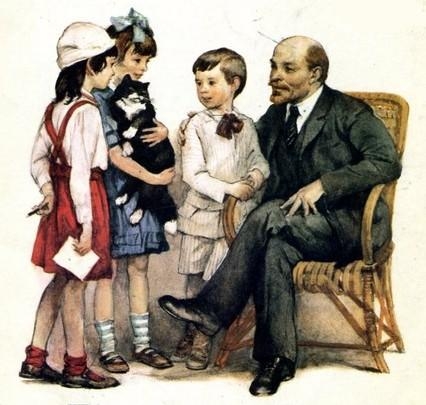“…We need that generation of young people who began to reach political maturity in the midst of a disciplined and desperate struggle against the bourgeoisie. In this struggle that generation is training genuine Communists; it must subordinate to this struggle, and link up with it, each step in its studies, education, and training.”
-V.I. Lenin, Tasks of the Youth Leagues (Bourgeois and Communist Morality)
After the Bolsheviks achieved total power within the Russian government many things began to change. Apart from internal matters, the the biggest question was how to maintain and extend soviet power over a vast empire. Though this question circled within Lenin’s mind, Russia was still involved externally with the Great War and internally with a violent civil war. Allies demanded that Russia continue their presence in the war, while many Russian citizens demanded that they abandon. Questions and demands were still being asked by the public and the Bolsheviks were expected to deliver answers and solutions. To resolve these problems, Bolshevik officials utilized two methods: ideology and tradition. Bolshevik ideology was the “obsessive determination to build socialism as the historical antithesis of capitalism” (Freeze, 292) and tradition was drawn from the former bureaucratic power. The fusion of these two methods led Bolsheviks to victory and winning the majority over the Russian population.
In regards to Soviet expansion, Bolshevik leader Vladimir Lenin, was interested in producing a new generation, the generation of Soviet children. Children were being born and they had little to no knowledge or understanding of the revolutions that had just recently been put down. Education and training would not be left to just the parents, therefore the Soviets took control. The new generation of Soviet children would not experience harsh working environments for long hours and low pay, they would not experience a never ending need for food, and they would not witness the killings of innocents, this generation would be better.
Instead, they would attend schools for education and participate in after-school events, like the Pioneers, an organization for younger children and the Young Communist League that was designed for teenagers and young adults. More than anything, the introduction of education and organizations was to promote the Socialist cause and create a feeling a national pride and community. Lenin understood that some of the older generation would not be easily swayed, so he started on the youth and began to grow and nurture his Soviet children.
Bibliography
Freeze, Gregory L. Russia A History. New York: Oxford University Press Inc., 2009), 292.
“Raising Socialist Youth.” Seventeen Moments in Soviet History. December 29, 2015. Accessed February 9, 2018. http://soviethistory.msu.edu/1917-2/raising-socialist-youth/.
“The Soviet Cult of Childhood.” Guided History. Accessed February 9, 2018. http://blogs.bu.edu/guidedhistory/russia-and-its-empires/elise-alexander/
Ilnitsky, Sergei. “Vasily Kafo Old Photo Young Pioneer Organization.” The Young Pioneer Organization of the Soviet Union. Accessed February 9, 2018. https://ilnitsky.photoshelter.com/image/I0000c83.rAlFczo


How influenced were children by their education in schools compared to the influence their parents had over them? Did the older generation oppose the ideas that were taught to their children?
LikeLike
You mentioned that used bureaucratic power to enforce tradition. Do you mean a new Bolshevik tradition or did the Bolsheviks utilize elements of the old tradition to bring more people to their new ideology?
LikeLike
Referring to the Freeze text, the Bolsheviks at times used elements of the old regime in their decisions and actions. Although the Freeze text says that it wasn’t intentional, I think the Russian population may have appreciated that some traditions didn’t change.
LikeLike
I really enjoyed this post. I thought it was so interesting how they used education as tool for control. The picture you included is so interesting as well. I personally don’t think of Lenin as a loving father figure, but in that picture he sure does look like one.
LikeLike
But of course, it’s all about that propaganda!!
LikeLike
Education is especially important for a new, ideologically-driven government. How can you implement socialist policies if no one would know what that entails? In your research did you find how successful this program was in raising a new generation of socialists?
LikeLike
Personally, I think it went well considering his predecessor Stalin and even Putin today use propaganda to influence young minds within the country.
LikeLike
Starting with the children, in my opinion, was a genius move on Lenin’s part for exactly the reasons that you mentioned: they don’t remember the hardships or revolutions because they didn’t live through it like the older generations. Further, children can easily be swayed one direction or another, thus educating them within a socialist ideology will more than likely led to their belief in the ideals of socialism.
LikeLike
This seems like such an important vision: to emancipate future generations by focusing on education and enlightenment. Not sure what to make of happy papa Lenin in the image — seems a bit like Norman Rockwell?
LikeLike